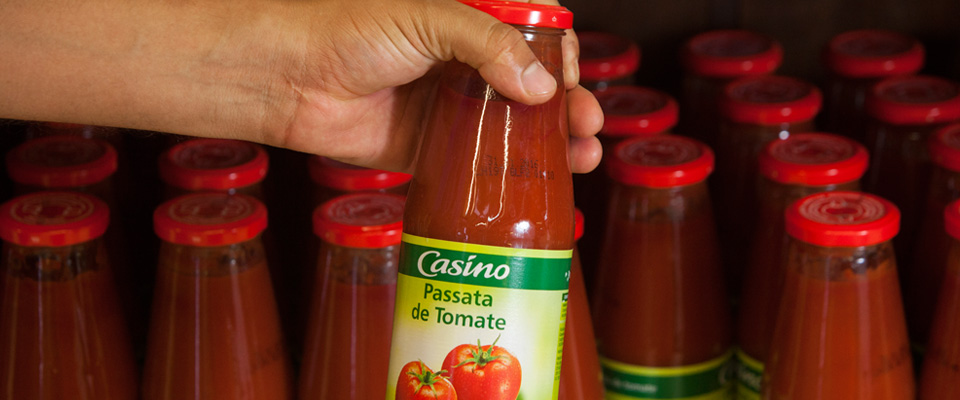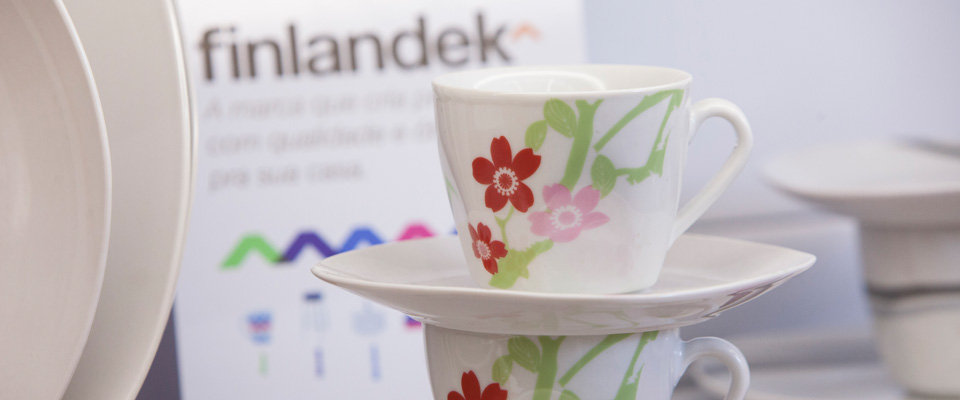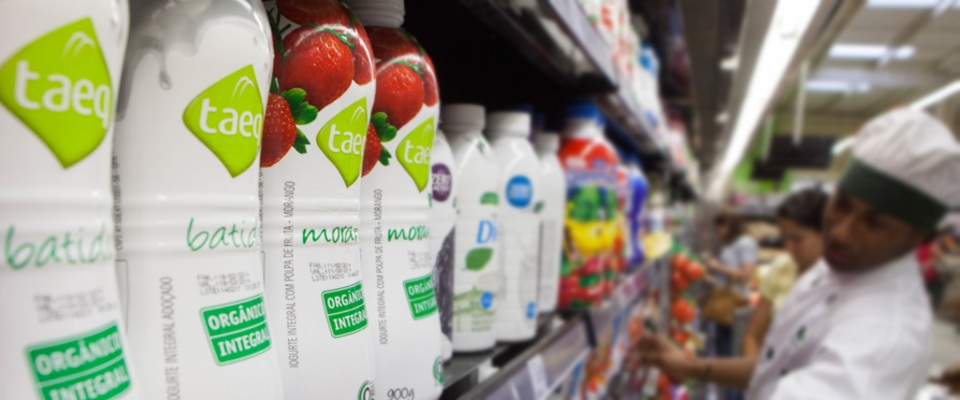A Focus on Sustainability
Transformation in the Chain of Value
A Focus on Sustainability
Transformation in the Chain of Value
GPA tries to act as an agent for change in the chain of value, developing initiatives that generate real value and permit the dissemination of concepts of sustainability among its principal stakeholders.
To support this work, the Group has a Quality Assurance department active in three areas: developing trusted suppliers; quality control; and food security.
The department is also responsible for inspecting the factories of industrial partners. At Distribution Centers throughout Brazil, there is a control process for deliveries, toward mitigating risks relating to quality and failures to comply with legal and food safety requirements. This work is based on GPA’s internal norms and standards as well as applicable law.
Aspects like safety, integrity of the consumer, sustainability and social responsibility are also monitored in non-food products, to ensure customer satisfaction and brand integrity. All imported products are mapped and submitted to the Quality Assurance department’s development and control process.
Product quality – Multivarejo
Before arriving on supermarket shelves, all products undergo risk evaluations for ingredients and legal aspects, to comply with Brazilian regulatory standards (ANVISA and Ministry of Agriculture) and validate labeling to ensure consumer health, integrity and well-being.
For exclusive brands like Taeq and Qualitá, and for our import process, this work commences at product development. Labeling content follows applicable law and the standards that govern each type of product, with instructions on use, information on handling and preservation, explanations of the outsourcing of certain components and descriptions of substances that may have socio-environmental impacts and effects on consumer health and safety.
The Group is also directly responsible for complying with the standards applicable to non-food products: outsourcing of product components or services, substances that may generate an environmental or social impact, safe use of the product or service, product disposal, nutritional labeling, additional nutritional information, consumer alerts, information on allergens and product registration with the applicable regulatory agency.
Suppliers <HR1, HR2, HR6 and HR7>
In keeping with its sustainability guidelines, all GPA contracts with service providers include a clause with a commitment to execute the services in accord with the applicable legal, normative and administrative provisions of the cities, states and country. Furthermore, pursuant to its Code of Moral Conduct and the principles it stands for, it requires service providers (that employ labor) not to use child or forced labor and to distance themselves entirely from companies that do. Violations may result in breach of contract with any company in the Group.
In 2013, none of the food or other suppliers inspected by GPA presented any irregularity that could run counter to the labor law of each country or the Universal Declaration of Human Rights.
For foods, nine suppliers were assessed with a focus on human rights; although the questions associated with these factors are not included in contractual provisions, they are part of the Group’s risk mapping. For 2014, the expectation is to increase the number of suppliers controlled and audited by 5% and remain 100% in compliance on matters of this nature.
In Retail, through the ABVTEX Program to Certify Suppliers, all textile suppliers are audited using criteria developed by ABVTEX, obtaining approval to continue to supply GPA. Proof of maintenance of the certification is solicited periodically. Every month, the commercial team monitors the activity of companies in this segment.
In 2013, the Group fulfilled the goals of 100% of suppliers outside the state of São Paulo having ABVTEX certification and 100% maintenance of the certification after two years. For 2014, the objective is to continue to monitor the audits of the textile sector and its respective recertification, and monitor ABVTEX’s plan to certify other categories that are not currently covered by the program, such as accessories and shoes.
Quality from the Source
Considered one of GPA’s most important programs for monitoring product quality, Quality from the Source covers the chain of suppliers of fruits, legumes, vegetables and eggs. The main objectives of this initiative are to develop suppliers’ chains of production, train them to comply with applicable law, improve the system of production and orient consumers, providing a higher level of trustworthiness at the time of purchase.
Quality from the Source monitors good agricultural practices, strictly controls the use of pesticides in all product processes, and checks the physical and visual condition of the products. This work is done by companies certified by the Instituto Nacional de Metrologia, Normalização e Qualidade Industrial (INMETRO). In addition, the program is aligned with the Programa de Analises de Resíduos de Agrotóxicos (PARA), of the Agência de Vigilância Sanitária (ANVISA), which constantly measures pesticide levels in foods.
Suppliers can follow the results through an online platform. At the site, it is possible to access information such as the audit score, the grade on the inspection at arrival and results of the analysis of pesticide residues when the products arrive at the Group’s distribution centers. Whenever necessary, work to develop a supplier is undertaken with the help of a technical team that handles the interface between clients, retailers and producers.
Participation in Quality from the Source is voluntary; by the end of 2013, 626 suppliers participated. Social and environmental criteria will also be assessed, to encourage suppliers to continue to improve their production processes and promote actions that are reflected in the quality of life of the workers.
Stages of evaluation
<PR2>Before being marketed in Group stores, imported foods and other products are submitted to evaluations, including:
Research and development
Applicable to durable household goods (representing less than 5% of the overall mix). All imported foods have health and safety assessments (such as information on allergens and nutritional labeling.
Certification
Inspection of toys, school materials, party items, tires, appliances, baby strollers, batteries and telecommunications items, which represent roughly 30% of all products.
Product manufacture
Applicable to all imported products (foods and non-foods), primary chain suppliers and high risk national products, which account for less than 5% of all products.
Storage, distribution and supply
Applicable to all imports (foods and non-foods), primary chain suppliers and high risk national products, whose share of the Group’s sales is less than 5%.
GPA’s goal is to ensure maintenance of the levels of control and compliance for 100% of the items imported.
Recognition
Thanks to the effort to track and control of toxic residues in the products, the Quality from the Source Program is recognized by ANVISA as a model for quality in retail. In addition, its procurement of fruits, legumes and vegetables has been approved by ISO 9001, one of the most important certifications in the world for managing quality.
Quality from the Source for beef
The Quality from the Source Program for beef was initiated on the ranches that partner with GPA that raise Galician Blond cattle. The work starts with selecting ranches and meatpackers, making it possible to track the entire cycle: insemination, birthing, animal well-being, industry and transport to the stores.
Partners are encouraged to assume the commitment to and responsibility for people and animals. Proof that it is possible to produce tender, high-quality meat, mitigating risks to the environment.
With the success of the program, the initiative was expanded to other kinds of beef. Toward this end, GPA has involved all its suppliers, monitoring for tenderness, microbiological quality and residues. All the processes are audited.
Exclusive brands <EC6>
Attentive to the level of excellence of its exclusive brands – Taeq, Qualitá, Casino, Club des Sommeliers and Finlandek –, the Group monitors consumer feedback at the points of sale and inspects products at the distribution centers.
The items in the Casino and Club des Sommeliers lines are also controlled by Casino in France. Finlandek (bazaar items and textiles) is monitored by the Quality Assurance team, which follows all the requirements for quality and standards established by GPA.
In 2013, the Next Steps in Quality Program was initiated with 120 suppliers that produce processed foods. The objective is to improve the supply chain through the continual evolution of the suppliers, so that they reach international levels of certification and meet the Group’s quality and safety standards. Divided into three stages, the program will go into effect in 2014 with suppliers of fruits, legumes and vegetables.
Caras do Brasil (Faces of Brazil) <EC6, EC9, HR2, HR6 and HR7>
Since 2002, GPA’s Caras do Brasil program has encouraged the development of sustainable management at small producers, fair trade, income generation, respect for the environment and social inclusion. As of 2014, the program will expand to cover the suppliers of the Group’s exclusive brands.
The objective of Caras do Brasil is to value local culture by marketing products developed by communities and organizations throughout Brazil (artisans, cooperatives or associations). The line consists of foods, decorative objects and artisanal pieces sold at 107 Pão de Açúcar, Pão de Açúcar Delivery and Extra Delivery stores, with roughly 10 items in the testing phase.
The program has roughly 140 products from 12 states in Brazil, predominantly in rural areas. The requirements for participating in the initiative are: complying with the applicable health and sanitation laws, being in good standing with the tax authorities, issuing proper sales receipts, and producing through sustainable practice. Candidates that want to participate in Caras do Brasil can register directly on the program’s site (www.carasdobrasil.com.br, under the link “Be a Supplier"). Periodically, consultants conduct Eligibility visits to attest to the sustainable production of the products. At such time, a questionnaire covering social, economic and environmental matters is conducted, and its results are applied to improve production, toward fomenting local economies, with the development of small businesspeople. For 2014, the goal is to conduct Eligibility Assessments at 40% of the active suppliers and 100% of the new suppliers.
Also in 2014, the Group intends to extend the sale of the products to all Pão de Açúcar stores and increase the number of suppliers by 10%, so as not to overload the existing ones. One of GPA’s policies is to limit its purchases to 70% of the material produced, so that the producer establishes other commercial relationships and thus expands its chain. Over the long term, another goal of the program is to expand sales of program products to other stores in the Group.
SUPPLIER DEVELOPMENT
In 2013, the work of Supplier Development and Quality Assurance in the food sector was restructured. By the end of 2013, the initiative covered nine primary suppliers. In non-foods, this process has been in place since 2011.
VIA VAREJO
Through the Third Party Management program, Via Varejo tries to mitigate the risks of labor claims and ensure operational efficiency. In hiring suppliers, the company evaluates economic, asset and financial aspects of the service providers, and requests labor and social security certificates, balance sheets and information on the financial dependence of clients. After finalizing the contract, Via Varejo demands all the pertinent documents to ensure contractual protection, and starts checking the working conditions of the suppliers, avoiding slave-like labor and ensuring that all labor and human rights aspects are in order.
ASSAÍ <HR8>
In 2013, 15% of the security team received human rights training. For 2014, the goal is to develop a publication on training in Loss Prevention, in addition to training bosses, inspectors and other store employees on proper procedures.
FREEDOM OF ASSOCIATION <HR5>
The freedom of labor association is guaranteed under the Constitution (article 8, CF/88), and extends to suppliers. GPA complies in full with this requirement, in permitting, whenever asked, union campaigns at its branches. The types of operations in which there is known risk that this right may be availed of are the primary chain, small suppliers, textiles, electronics and bazaar goods imported from emerging regions.
LOCAL CONTRACTING
GPA invests in developing a more sustainable chain of value, with the utilization of local labor, so that logistics are more efficient and have lower costs. This commitment has contributed to regional development and job creation. In addition, the Group develops programs to support local producers, helping them to structure their business and encourage the sale of their products in its stores.
Customers
GPA believes that the success of the business is directly linked to its relationships with customers. Accordingly, meeting the expectations of this constituency and placing the consumer at the center of its strategic decisions is one of the Company’s guidelines, which tries to maintain effective communications with consumers, through exclusive channels, opinion surveys and the development of new products.
For Extra and Pão de Açúcar, quantitative research is conducted to assess customer satisfaction with prices, forms of payment, promotions and deals, product quality, service, and the store environment and structure. In 2013, approximately 5,500 interviews were conducted in the most important markets for each banner: Extra Hiper (São Paulo, Rio de Janeiro, the Federal District and Recife), Extra Super (São Paulo and Rio de Janeiro), Minimercado Extra (São Paulo) and Pão de Açúcar (São Paulo, Rio de Janeiro, the Federal District and Fortaleza).
Assaí tries to understand better the opinions and levels of satisfaction of its customers in all the channels, including online. For 2014, digital channels will be structured to observe consumer behaviors and identify their main demands and questions on the company’s products and services. At Nova Pontocom, customers can describe their experiences at the site itself: 89.51% would buy at the company again, exceeding the goal of 85%.
Channels for relationships <PR5 and PR8>
Casa do Cliente, which is an interactive channel for consumer contact, serves GPA’s retail food operations in the relationship with Pão de Açúcar and Extra customers in all their formats, as well as Assaí self-service wholesale consumers. The channel’s objective is to increase customer satisfaction, guarantee effective service and correct any problems. It can be accessed for criticisms, suggestions, questions, requests or comments by telephone, email or social networks. In 2013, Casa do Cliente was contacted 327,321 times, and brought forward 100% customer satisfaction. The methodology for measuring satisfaction follows the Customer Relationship Manager (CRM) standards.
Being a group with multiple brands, customer satisfaction can also be measured through an analysis of the organizational image and reputation. In 2013, effective feedback loops were structured such that customers are surveyed for satisfaction on all the services provided.
There were no complaints through any channel about violations of privacy or loss of customer data, nor leaks of data, thefts or losses of customer data on Casa do Cliente’s database.
Communications and Marketing <PR6>
GPA’s commitment to consumers is marked by truth in information and compliance with Brazilian advertising laws and standards.
All communications and marketing is in compliance with the guidelines established by the Caixa Econômica Federal and the Secretaria de Acompanhamento Econômico, the sector’s regulatory agencies. In addition, the Group reports to the Escritório Central de Arrecadação e Distribuição de Direitos Autorais (ECAD) whenever it uses music in its campaigns, and pays the fees provided in Law nº 9.610/98, on Copyrights.
GPA is affiliated with the Associação Brasileira de Marketing Direto (ABEMD), which regulates direct marketing. Marketing via print and digital media, television or radio follow the rules of the Código Brasileiro de Autorregulamentação Publicitária (CONAR).
Any production, purchase or use of photos on the part of the Company respects copyrights, and contracts with youth under age 18 are signed by the parents.
Local Suppliers <EC6>
The GPA policy prioritizes the relationship with suppliers who preferably have factories in the country. Among the non-food suppliers, 73% of the budget was allocated to the purchase of items produced by local companies. In the non-food segment, the goal is to reduce direct imports, currently made by the GPA itself.
In Via Varejo, 98.98% of purchases come from local suppliers, that is, of Brazilian origin - representing 99.39% of company revenues. For Assaí, 99% of the budget was allocated to hiring local companies (operating in national territory) and the Nova Pontocom 95%.






